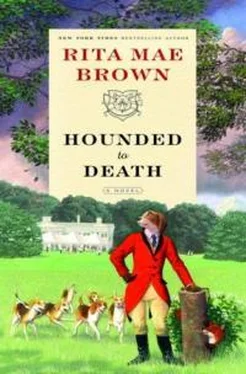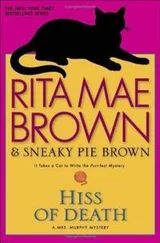“You’ll have forgotten by then,” Golly sassed.
“I will not,” Rooster called up.
“Ignore her. All she wants is attention,” Raleigh counseled.
“He’ll forget. Rooster’s older than dirt. His mind is going.” The calico thoroughly enjoyed the torment.
“I will not.” Rooster was sixteen and there was a smidgen of truth to Golly’s accusation.
“Doggy Alzheimer’s.”
Raleigh, hoping to make light of the situation, replied, “Halfheimer’s. He’s not that old.”
“Oh, yes he is.”
“You’re nine yourself.” Raleigh could count as well as anyone else.
“The prime of life!” She dropped her luxurious tail over the branch, allowing it to hang for effect, much as a lady might trail one end of a feather boa.
As the house pets indulged in their war of the words, Sister marveled at the clouds of dust. “Thank the Lord for air-conditioning.No more open windows.”
“The Weather Channel said our water level is twelve inches down for this time of year.”
“Tootie, I really believe Al Gore is right. I’ve seen too much change in the weather in too short a time. Damn those puppies.”
“I guess it’s better they run off now, rather than when we start cubbing.”
“Wise words. No wonder you’re going to Princeton.” She smiled.
“I’m pretending I’m excited. Dad keeps asking why I’m not declaring a major in business right away.”
“He’ll let up,” Sister predicted, as the red GMC climbed the twisting road to the top of Hangman’s Ridge.
The two women got out of the truck. Even in the morning heat, a chill pervaded the air.
Sure enough, the youngsters had seen ghosts at the tree, which had so scared the bejesus out of them they’d scampered down the side of the ridge toward the farm. However, the underbrush was so thick, Sister and Tootie couldn’t see them.
“Hey, what’s this?” Taz crawled over to a big fox den.
Originally, this had been Georgia’s den when she left her mother, but she had relocated closer to the kennels. The new living quarters were more pleasant, plus she could visit the hounds at night. There was never a shortage of treats lying about the barns either. And her mother, Inky, was usually there. Inky and Diana were special friends.
“Fox den.” Twist knew that much.
“Wow.” Taz inhaled the heady scent of eau de Vulpes, plus something else equally tantalizing.
“Is someone in there?” Twist called down.
“Yes, you silly ass, and I’ll thank you to leave!” a voice boomed out, making both hounds step back.
“Who are you?” Taz worked up her nerve.
“Who are you?” came the saucy reply.
“I’m Taz and this is my sister Twist. We’re foxhounds, and we live at Roughneck Farm.”
“Good. I’ll run you two until you drop from heat exhaustion. I’m Thales, and I’m the fastest fox in the whole world.” Thales certainly did not suffer from an inferiority complex.
“What’s that other smell?” Twist edged up to the mouth of the den.
“An old toy. You can have it.” The fox chuckled to himself because he figured his toy would bring them trouble.
Thales, named for a Greek philosopher, was far more sly than the original Thales ever was, a man so entranced by higher thought that he fell right into a well as he contemplated the sky.
“I hear them.” Tootie pointed toward the steep incline.
“So do I.” Sister walked to the edge of the ridge; a light breeze swept over her, for there was always some wind up there. “Come on, Twist, come on, Taz. Let’s go.”
Twist, boot in mouth—that was Thales’s toy—said nothing. Taz, beginning to understand that she had seriously discomfited her master, said, “We’d better go.”
“I’m taking the toy.” Twist dropped it for a moment. “We’ll see ghosts again.”
“If Sister’s there, I won’t be scared.” Taz had confidence in the master.
“Tootie’s there, too.” Twist lifted her head, inhaling deeply. “All right.” She picked up the boot.
“Stupid pups.” Thales laughed as they pushed up through the undergrowth.
“There you are. Come along.” Sister knelt down.
Taz ran right up but Twist wanted to show off her trophy. She circled.
“Twist, come on.” Tootie knelt down, too.
Although the humans lacked the superior olfactory equipment of the hounds, the work boot, tongue chewed off, emitted the unmistakable odor of old rot.
Twist walked right up and dropped the boot at Tootie’s feet. Involuntarily, she took a step back.
Sister blinked. “Let’s get these two in the truck first.”
Happily the two leaped into the front seat, where they would ride. Sister closed the door and she and Tootie returned to the grisly toy.
“There’s a foot in there.” Tootie held her nose. “Mostly bones but still some flesh down in the toe.”
“The worms have given up on it.” Sister walked back to the truck and put on her gloves. Then she carefully picked the trophy up and placed it in the bed of the truck.
Tootie squeezed in next to the hounds, and Sister, worried, started down the ridge.
“Sister, there has to be more than a foot,” Tootie said, a slight wave of nausea rising up.
“That’s what worries me. Violence is coming closer and closer to home.”
CHAPTER 16
The blue-gray smoke from a true Montecristo—Cuban, not Dominican—curled overhead. Ben Sidell, not much of a smoker, treated himself to a special cigar every time he came back from the morgue. Viewing bodies in various conditions of decay or freshly ripped apart by violence was part of his job, but not a part he relished. How the coroner and his assistants adjusted to the stench amazed him. Even the odor of old death that had lingered in the work boot offended him, made his eyes water. So once back outside he lit up, inhaled, closed his eyes, and considered the problem.
One problem, not immediately apparent, was smoking a contraband cigar. He slipped the paper cigar ring off the dark-golden-leaf wrapper, dropping it in his pocket. Ever since he was a kid he had saved cigar bands.
When Sister called him that morning, he’d immediately driven out, taking a rookie with him. Along with Sister, Shaker, and Tootie, they scoured Hangman’s Ridge. The chiggers feasted on the poor rookie, a suburban boy who didn’t know that one had to smear oneself with insect repellant to thwart the tiny little irritants. Once the chigger burrowed in your flesh, no amount of digging, applying alcohol to the tiny pinprick site, or cursing removed the insect. And the scars from scratching—for there was no way to stop scratching—stayed for months.
After fighting through undergrowth and sweating like pigs, they found nothing—apart from the chiggers dropping off cedars—not even an eyelet from the chewed-off part of the boot.
After that exercise in futility, Ben returned to his desk at headquarters, blissfully air-conditioned, to pore over the file of missing persons reports from the last six months that his staff had assembled while he was on Hangman’s Ridge. Most of those gone missing had been found, including a few older people who had wandered off from home, minds gone and families not able to afford full-time care; Ben studied these reports to see if, of those who had perished, the bodies were all intact. Yes.
After two hours of examining every detail, he slapped the folder shut. The coroner had estimated the age of the remains at three months. Decay accelerated in heat and humidity; even though pieces of foot remained in the toe box of the boot, the death and apparent dismemberment weren’t recent.
Читать дальше












